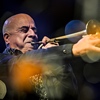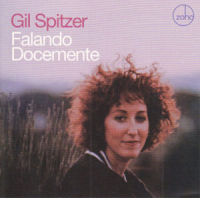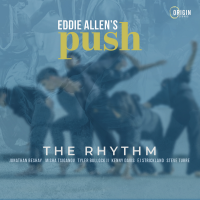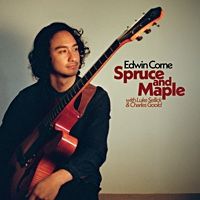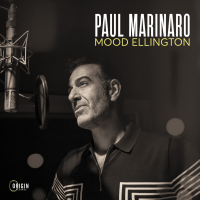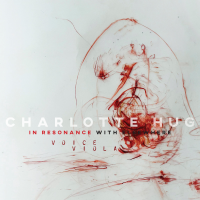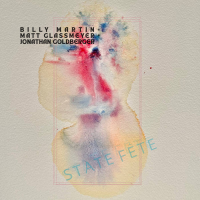Home » Jazz Articles » Album Review » Anouar Brahem: Blue Maqams
Anouar Brahem: Blue Maqams
Improvisation has always been a fundamental aspect to Brahem's music, whether in his sublime trio featuring double bassist Dave Holland and reed multi-instrumentalist John Surman on 1998's Thimar, or his similarly nuanced—but with pianist Francois Couturier and accordionist Jean Louis Matinier significantly altering its complexion—trio recording Le pas du chat noir (2002) and 2006 follow-up, Le Voyage de Sahar. Still, rarely have extemporization and group interaction featured so significantly in the forefront as on Blue Maqams. Following his in-concert revival of the Thimar trio with its first performance in twelve years at the 2011 Festival International de Jazz de Montréal, followed by a reprise, the following year, at the TD Ottawa Jazz Festival, it may come as no surprise that Brahem has chosen to once again rekindle his relationship with Holland.
Nor should it come as a surprise that, upon deciding to work with a "traditional" jazz rhythm section, the oudist has recruited drummer Jack DeJohnette. Holland and DeJohnette have a longstanding history together, as members of trumpeter Miles Davis' early '70s group, and they've continued to work together in various contexts across the decades, including a number of classic ECM recordings including trumpeter Kenny Wheeler's Deer Wan (1978j and a series of recordings, as the Gateway Trio, with recently deceased guitarist John Abercrombie.
But when it came to finding a pianist for this recording, it was the serendipity of Manfred Eicher's decision to record pianist Django Bates' upcoming third album with his Danish Belovèd Trio, The Study of Touch—its first for the label, and which the producer/label head played for Brahem as the oudist was trying to settle on a pianist for the date—that proved the impetus to recruit the British pianist for Blue Maqams. Bates—no stranger to ECM fans for his two mid-to-late '80s recordings with First House, as well as two similarly overlooked gems by Norwegian vocal experimentalist Sidsel Endresen in the early 90s—proves more than an inspired choice for Blue Maqams.
This may be Brahem's first encounter with DeJohnette as well, but given the oudist's deep relationship with Holland, and the bassist's decades-long relationship with the drummer, there's a kind of chemistry-by-proxy that would most certainly have made Blue Maqams a successful—even great—trio record. But Bates, who has little-to-no prior connection with any of these players, brings an even greater sense of the unexpected and unpredictable, his finely dveloped sense of lyricism matched by equally well-honed abstractions...and an ability to fashion seemingly instantaneous connections to the musicians with whom he comes in contact.
From the first moments of his entry into the album-opening "Opening Day" around the two-and-a-half-minute mark—with Brahem beginning alone and gradually joined, first, by Holland, then by DeJohnette and, finally, by Bates—the profundity of his contribution to this session is immediately and eminently clear. Initially echoing Brahem's improvised lines, Bates slowly introduces both ethereal harmonies and foreshadowing references to a re-articulation of the composition's theme by oud, double bass and piano, with DeJohnette dropping out briefly. As DeJohnette reenters—his delicate cymbal work and soft snare providing all the support that's needed—sinewy bass lines mesh with pianistic atmospherics in a gradual migration, once again, to the song's theme and ultimate conclusion.
Bates' touch is as willowy as Holland's is firm, setting the stage for a nine-piece, 77-minute program of Brahem originals, largely written over the past six years barring two composed back in 1990: the eminently groove-driven "Bom Dia Rio"; and slower-paced "Bahia," a piece familiar, albeit in a very different context, to fans of Norwegian saxophonist and label mate Jan Garbarek's cross-cultural 1994 trio date with the oudist and Pakistani tabla master Ustad Shaukat Hussain, Madar.
With all but two tracks ranging from eight to nearly eleven minutes, there's plenty of room for this quartet to explore some of Brahem's most captivating music to date; music where improvisation is a fundamental, to be sure, but without ever fully abandoning Brahem's carefully considered compositional forms. The lines between form and freedom may seem clear on a superficial listen. With each subsequent encounter, however, the manner in which Brahem, Bates, Holland and DeJohnette interpret the oudist's material feels deeper and more profound, as those lines begins to break down and, on occasion, dissolve entirely. The music feels, at times, closely aligned with the tone and modality of Brahem's inescapable Tunisian roots, but elsewhere—particularly on "Bom Dia Rio" and the ultimately more fervent "Persepolis's Mirage"—approaches a more recognizable jazz aesthetic, despite being anything but conventional.
DeJohnette and Holland's decades-honed chemistry and experience in countless musical contexts make them the perfect rhythm duo. Lithe, fluid and elastic both texturally and tonally, they help shape some of Brahem's most rhythmically propulsive music to date while also contributing solos that demonstrate their ineffable ability to somehow always get to the deepest core of the music and its intentions. Bates—whose own discography is a diverse blend of music serious, deeply lyrical and, at times, wonderfully irreverent—similarly connects with the heart of Brahem's writing, and shines throughout an entire recording filled with both the joy and surprise of a first encounter and the relaxed sense of comfort, empathy and familiarity that suggests—true though it may not be—an ensemble with many years under its collective belt.
Blue Maqams is not Brahem's first recording to include a "jazz" rhythm section; 1995's also-wonderful Khomsa is a septet date anchored by another decades-old rhythm team, double bassist Palle Danielsson and drummer Jon Christensen. But its broader textures of accordion, piano/synthesizer, saxophone and violin—and pan-cultural blend of Tunisian, French and Norwegian concerns—render it an entirely different experience. Even Blue Maqams' penultimate "The Recovered Road to Al-Sham"—whose first seven minutes migrate from a delicate arpeggio-driven solo feature for Bates to a telepathic duo with Brahem and, ultimately, a beautifully articulated oud solo—resolves into a viscerally propulsive groove driven by Holland and DeJohnette, bolstering a closing solo from Bates that, in its spare construction, effortlessly closes the gap between mellifluous melodism, abstract ideation and harmonic sophistication.
Sonically pristine, lush and crisp, though the album seems to resonate with the natural warmth and reverb of a large hall, it's a sound fashioned judiciously, in fact, at New York's Avatar Studio, where the album was recorded just five months ago.
With Bates, Holland and DeJohnette as his partners on Blue Maqams, Brahem is clearly inspired to deliver some of his best, most unfettered playing to date, occasionally combined with his soft vocalizing. Indeed, Blue Maqams is the most open-ended, fully improv-dependent album of the oudist's career. If every album in his discography represents some kind of artistic breakthrough, Blue Maqams goes a step further; as exciting as its relentless unpredictability is, it's a conceptual breakthrough that will, no doubt, be even more thrilling in performance. But as studio recordings go, Blue Maqams captures no shortage of that excitement, and will not only go down as one of the year's best ECM releases; it's a classic-in-the-making that should ultimately be considered one of the label's very best recordings in its nearly fifty-year history.
Track Listing
Opening Day; La Nuit; Blue Maqams; Bahia; La Passante; Bom Dia Rio; Persepoli's Mirage; The Recovered Road to Al-Sham; Unexpected Outcome.
Personnel
Anouar Brahem
oudAnouar Brahem: oud; Dave Holland: upright bass; Jack De Johnette: drums; Django Bates: piano.
Album information
Title: Blue Maqams | Year Released: 2017 | Record Label: ECM Records
Tags
PREVIOUS / NEXT
Anouar Brahem Concerts
Support All About Jazz
 All About Jazz has been a pillar of jazz since 1995, championing it as an art form and, more importantly, supporting the musicians who make it. Our enduring commitment has made "AAJ" one of the most culturally important websites of its kind, read by hundreds of thousands of fans, musicians and industry figures every month.
All About Jazz has been a pillar of jazz since 1995, championing it as an art form and, more importantly, supporting the musicians who make it. Our enduring commitment has made "AAJ" one of the most culturally important websites of its kind, read by hundreds of thousands of fans, musicians and industry figures every month.




